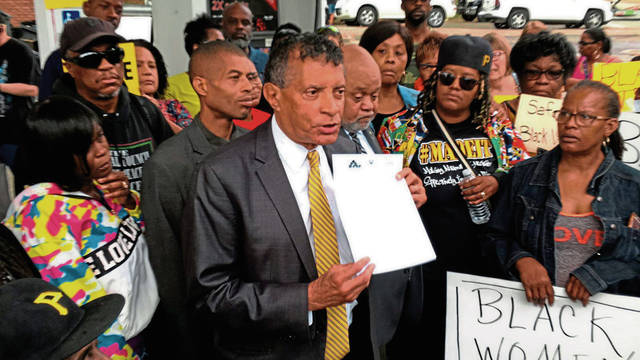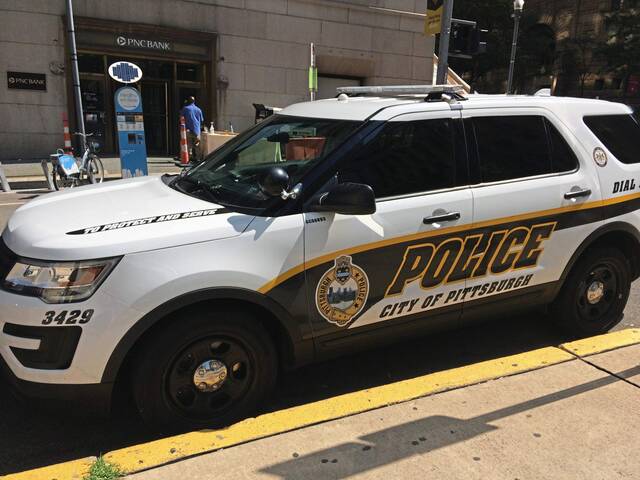The founding leader of a Black activist organization that has lobbied for minorities in Pittsburgh for more than three decades says, as 2020 comes to a close, there is hope for substantive police reform in the city.
“As we end the year, there is some positivity in the air with regard to police reform,” Tim Stevens, founder of The Black Political Empowerment Project (B-PEP), said Tuesday.
Stevens, 75, has lobbied for reforms for 50 years through the NAACP and other groups. He founded B-PEP in 1986.
On Monday, he released 18 pages of correspondence between B-PEP and Pittsburgh officials, including Mayor Bill Peduto and Peduto’s Chief of Staff, Dan Gilman, that detail 21 commitments the city has made for police reform.
They include working to make the police department more diverse by bolstering Black recruitment efforts, reviewing whether a requirement that recruits complete 60 credits of college course work is needed, and developing policies and procedures to address bias in the department.
“The good news is there is movement,” Stevens said.
In the written materials Stevens provided, he invoked longtime Black leader Bill Robinson, who told Stevens the most consistent concern of the Black community was its relationship with police and dealing with police brutality and misconduct.
Robinson, a former city and Allegheny County councilmen and state representative, died in June.
“I echo Mr. Robinson’s sentiments,” Stevens said.
To do so, Stevens invoked a new word: “persistency.” He said it means the need to remain dogged and unrelenting.
“You have to sit at the table and keep going back-and-forth,” Stevens said. “You have to try to keep channels of communication open.”
Stevens has lobbied for reform long before the May 25 death of George Floyd by Minneapolis police galvanized national calls for police reform. There were dozens of protests in Pittsburgh and its suburbs calling for reforms.
Mayor Peduto’s encouraging actions
Stevens shared a letter he received Sunday from Peduto reiterating a commitment to B-PEP to continue work to reimagine “21st century policing.”
“We will work together on new initiatives and to learn best practices from around the world,” Peduto wrote.
There is already “a baseline of efforts” that have been made to change Pittsburgh’s police policies, Peduto wrote, including many of the recommendations from the Community Task Force in Police Reform the mayor convened in June. Stevens is a member of the task force.
“These partnerships and initiatives are critical steps towards our common goal of safe and vibrant neighborhoods for all Pittsburghers,” Peduto wrote.
The recent commitments in writing by Peduto are a good first step toward real reforms, and it’s the culmination of years of work.
Six years ago, B-PEP provided city officials with a 20-point letter detailing police reforms that were needed. In February and July, the group again reiterated the need for reforms and asked for written commitments.
“He (Peduto) basically came through with most, if not all, of what we requested,” Stevens said.
The strides the city has taken this year have left Stevens hopeful.
The passion of those who protested this summer “helped to give a new sense of urgency” for reform, Stevens said.
Earlier this year, council enacted a bevy of reforms, including a ban on chokeholds, ending the purchase of surplus military equipment for police use and a requirement that police officers have a “duty to intervene” when they are faced with a situation that doesn’t put the officer at a risk of bodily harm.
The city also started a Stop the Violence Fund to pay for programs that ultimately will allow a social service agency to respond to the calls resulting from addiction, homelessness and mental health issues that police now respond to.
Although other activists have called for a 50% cut in police funding, Stevens and B-PEP have not.
The aim now is to make sure the commitments are acted upon in 2021, Stevens said.
“Moving ahead, the commitments must be followed through and reinforced and even expanded upon,” he said. “The good news is there is movement. The good news is there are partners who seem willing to assist.”
Stevens acknowledged seeking reform is a long fight.
“We stayed at it. We’ve had decades of commitments,” Stevens said. “The problems continue to exist, and as long as I exist, I will attempt to attack those problems.”








